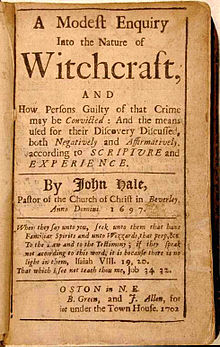Reverend John Hale
| John Hale | |
|---|---|

Title page of A Modest Enquiry Into the Nature of Witchcraft by John Hale (Boston, 1697)
|
|
| Born |
John Hale June 3, 1636 Charlestown, Massachusetts |
| Died | May 15, 1700 (aged 63) Salem Village, Province of Massachusetts Bay |
| Occupation | Minister |
| Known for | Minister associated with the Salem witch trials |
| Spouse(s) |
|
| Parent(s) |
|
John Hale (June 3, 1636 – May 15, 1700), commonly referred to as "Reverend Hale", was the Puritan pastor of Beverly, Massachusetts, during the Salem witch trials in 1692. He was one of the most prominent and influential ministers associated with the witch trials, being noted as having initially supported the trials and then changing his mind and publishing a critique of them.
John Hale was born on June 3, 1636, in Charlestown, Massachusetts. The oldest child of Robert Hale, a blacksmith, he was educated at Harvard College in Cambridge, Massachusetts, graduating in 1657. He began preaching in Bass-river-side, later called Beverly, about 1664, and was ordained as the first minister of the parish church there on September 20, 1667, when the congregation formally separated from Salem, and he remained until his death in 1700. He married his first wife, Rebecca Byly, on December 15, 1664, and she died April 13, 1683, at the age of forty-five.
As a child, Hale had witnessed the execution of Margaret Jones, the first of 15 people to be executed for witchcraft in New England, between 1648–1663. He was present at the examinations and trials of various people who were accused of witchcraft in the Salem witch trials of 1692, and supported the work of the court. However, on November 14, 1692, 17-year-old Mary Herrick accused his second wife, Sarah Noyes Hale, and the ghost of executed Mary Eastey of afflicting her, but his wife was never formally charged or arrested. A later commentator on the trials, Charles Upham suggests that this accusation was one that helped turn public opinion to end the prosecutions, and spurred Hale's willingness to reconsider his support of the trials.
In Arthur Miller's 1953 play The Crucible, a fictional portrayal of Hale appears in Act I in a request from Samuel Parris that he examine his daughter, Betty Parris. Hale's quick visit to help with Betty actually causes him to become one of the main characters in the play.
...
Wikipedia
